What I Learned in Africa
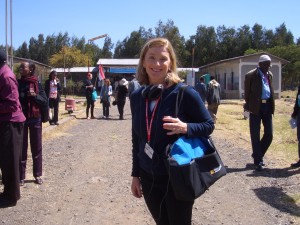 On a one-week reporting fellowship from the International Center for Journalists I learned something about sub-Saharan Africa and the challenges facing journalists who report on it in multimedia platforms.
On a one-week reporting fellowship from the International Center for Journalists I learned something about sub-Saharan Africa and the challenges facing journalists who report on it in multimedia platforms.
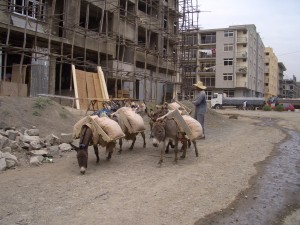
The sprawling suburbs of Addis Ababa, where donkeys on dirt roads carry cement to endless blocks of half-finished apartment buildings.
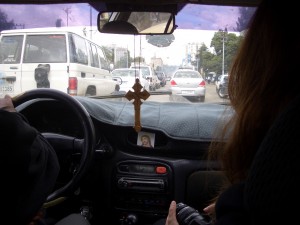
Another endless traffic jam!
Just getting around was tough. The Ethiopian capital of Addis Ababa is a giant perpetual traffic jam. Getting anywhere in an ancient Soviet-made taxi involved inching through traffic that is widely blamed on the light rail system the Chinese are constructing. Every major street in the path of the railway is torn up and only the major roads are paved. Read more about the traffic in this post.
Filing a story can be another challenge on the spotty wi-fi connections, even in the futuristic-looking African Union Conference Center. Yet, everyone in the street seems to be glued to a cell phone.
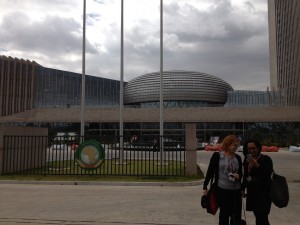
Journalists entering the African Union conference center.
Africa is in the midst of a “youth bulge,” with nearly 20 percent of the population between the ages of 15 and 24. Ethiopia was chosen as the site of the International Conference on Family Planning because of its success in promoting the use of contraceptives. Africa is hoping to reap a “demographic dividend” by reducing the birthrate in this generation’s childbearing years and educating these young people to become productive members of the workforce. A platoon of well-meaning PR people from donor foundations and countries had been dispatched to make sure visiting American journalists got the intended message; the US taxpayer is the biggest spender on family planning programs worldwide.
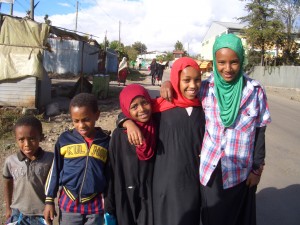
Our visits to a rural health clinic and a smaller health post were closely supervised by government officials. It took some serious persuasion to be allowed to talk to real clinic workers and patients with comments filtered through a government interpreter.
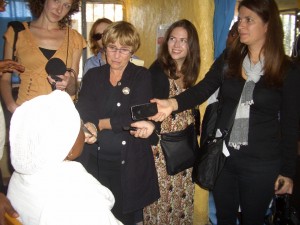
Through a government interpreter, ICFJ Fellows interview the 38-year old wife of a farmer. She has 8 kids and used contraception to space out the last three.
Officials seemed surprised when we weren’t content to take notes on their prepared statements. Ethiopia ranks low on indexes of press freedom; self-censorship is common among local journalists who risk being jailed for terrorism when questioning government policies. American journalists reporting on Ethiopia face a less risky but different challenge at this moment in history — getting the US news media to pay attention to any health story that’s not about Obamacare.
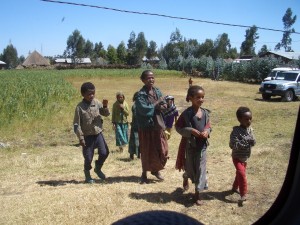
On a personal level, I enjoyed getting out in the field with a digital sound recorder, pocket HD video camera, digital still camera, smartphone, local cell phone, laptop and old-fashioned reporter’s notebook.
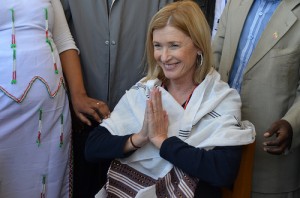
Juggling the different platforms made me realize what a luxury it would be to focus on doing a good job with just one medium; the journalists I coach today are expected to do it all — and look great on camera while communicating with the audience at the same time! The young reporters in our group impressed me with their insightful questions and command of technology. Although I barely got by, I got the story. No doubt the experience will make me a better talent coach in the US and a better media trainer helping people in developing countries tell their own stories. Many thanks to ICFJ, the Gates Foundation and the United Nations Population Fund. Read more about Ethiopia on my Travel Blog. Watch a video below:
Post updated on 9/16/2018 with new links.
Tweet





 Hi, I'm Terry Anzur. I've been a professional multimedia journalist for more than 30 years, anchoring and reporting everywhere from New York to Los Angeles to West Palm Beach. I've taught on-air skills to journalists of all levels, both through positions at the University of Southern California and Pepperdine University and through my own independent company.
Hi, I'm Terry Anzur. I've been a professional multimedia journalist for more than 30 years, anchoring and reporting everywhere from New York to Los Angeles to West Palm Beach. I've taught on-air skills to journalists of all levels, both through positions at the University of Southern California and Pepperdine University and through my own independent company.